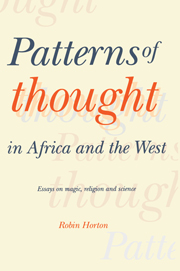Book contents
- Frontmatter
- Contents
- Acknowledgements
- Introduction
- BEGINNINGS
- MAINLY CRITICAL
- 2 Neo-Tylorianism: sound sense or sinister prejudice?
- 3 Lévy-Bruhl, Durkheim and the Scientific Revolution
- 4 Back to Frazer?
- 5 Professor Winch on safari
- 6 Judaeo-Christian spectacles: boon or bane to the study of African religions?
- MAINLY CONSTRUCTIVE
- Postscript
- Notes
- Bibliography
- Index
3 - Lévy-Bruhl, Durkheim and the Scientific Revolution
Published online by Cambridge University Press: 05 June 2012
- Frontmatter
- Contents
- Acknowledgements
- Introduction
- BEGINNINGS
- MAINLY CRITICAL
- 2 Neo-Tylorianism: sound sense or sinister prejudice?
- 3 Lévy-Bruhl, Durkheim and the Scientific Revolution
- 4 Back to Frazer?
- 5 Professor Winch on safari
- 6 Judaeo-Christian spectacles: boon or bane to the study of African religions?
- MAINLY CONSTRUCTIVE
- Postscript
- Notes
- Bibliography
- Index
Summary
Over the last seventy years, Western intellectuals have shown an increasing interest in the thought-patterns of peoples who, though contemporary, have cultures which are at once pre-literate, pre-industrial and pre-scientific. One root of this interest is the belief that such thought-patterns provide us with a clue to the nature of our own lost heritage – a heritage supposedly destroyed by the advance of science. The other root is the belief that only through the study of pre-scientific thought-systems can we get a clear view of the nature of science. Only if we have some idea of what it is like to live in a world into which the scientific outlook has not yet intruded, can we be at all certain as to what are the distinctive features of this outlook and what are simply universals of human thought.
Anyone aiming to enter this momentous field of enquiry can do no better than start with a careful study of the two great French philosopher-sociologists Lucien Lévy-Bruhl and Emile Durkheim. Between them, these two have had an enormous influence on the comparative study of human thought; and even today many of the ideas that dominate the field derive from their work.
In the present paper, I shall begin by comparing the ideas of Lévy-Bruhl and Durkheim on the relation between ‘primitive’ and ‘modern’ thought. I shall show that, between them, they have left posterity with two very different conceptions of this relation.
- Type
- Chapter
- Information
- Patterns of Thought in Africa and the WestEssays on Magic, Religion and Science, pp. 63 - 104Publisher: Cambridge University PressPrint publication year: 1993
- 4
- Cited by



